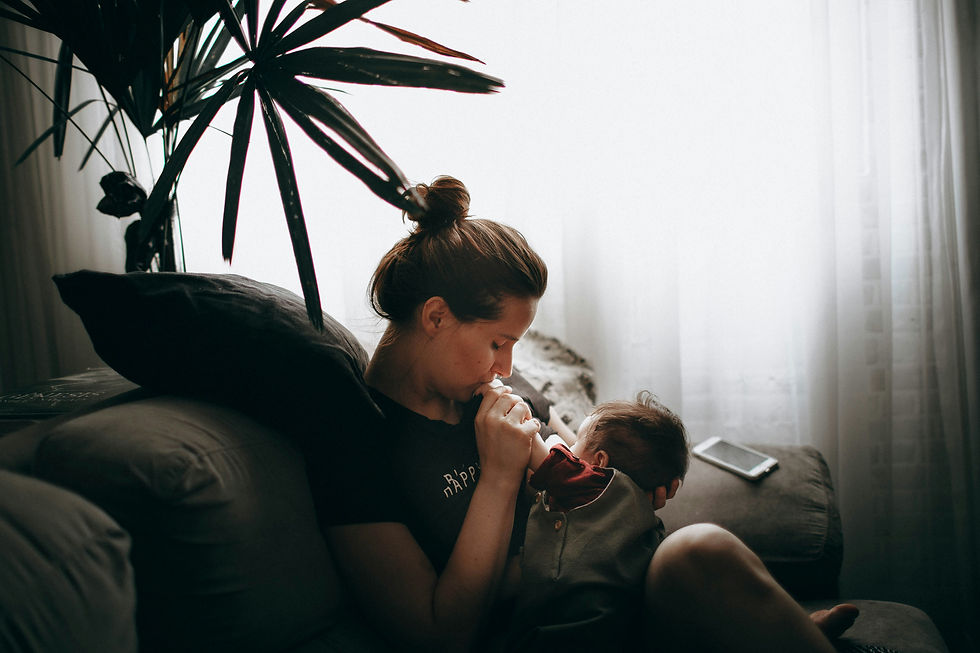It’s Not Just You: Why Autistic Parents Deserve Sensory Support – and a Sensory Village
- Zoe APUK
- Jul 9, 2025
- 3 min read
Updated: Jul 10, 2025
If you're reading this, chances are you’ve felt overwhelmed. Maybe not just emotionally, but physically – as if your entire nervous system is saturated. We all love our children, but we may also quietly dread another loud mealtime, another sensory meltdown, or another hour of being clung to when all we want is quiet. If this sounds familiar, I want you to know: you’re not a bad parent and you are definitely not alone.
From birth, children are biologically wired to seek sensory closeness – through cuddles, noise, movement, and proximity. This is how they attach and regulate themselves. For many Autistic children, this need can be even more pronounced. They may require more pressure, more proximity, or more repetition to feel safe and grounded (Daly et al., 2022). What may feel like "clinginess" is often a form of sensory co-regulation.
But this isn’t limited to Autistic children – it’s developmentally normal for babies and toddlers. Sensory seeking is part of how they bond and build relationships (Kerley et al., 2022). If your child constantly wants to be on you, under you, or in contact with you, it doesn’t mean you’re doing anything wrong. It means they trust you with their regulation. And that’s something meaningful, even when it’s draining.

Still, we’re allowed to have limits. That’s the other side of the story: being touched, talked at, looked at, or bombarded by sounds can become overwhelming – especially for Autistic people, whose sensory systems are often running on high alert. Research shows Autistic adults report significantly more sensory over-responsivity across domains - including sound, smell, touch, and movement – and that these experiences are strongly linked with core Autistic traits (Tavassoli et al., 2014).
Being overstimulated doesn’t mean you’re failing. It means your brain is processing more information at once, often without the usual filters. If it feels like something inside you snaps when one more noise hits – that’s not being ‘too sensitive’. It may be a sign of neurobiological overload.
Somewhere along the way, many of us internalised the idea that being a “good parent” means doing everything ourselves – and doing it perfectly. That if we just tried harder, we’d somehow become like those shiny Instagram parents who manage to educate, clean, cook, and smile all at once. But here’s the reality: that’s not a genuine social norm – it’s a curated illusion.
What’s real – across cultures and throughout history – is that parenting was never meant to be done alone. In most societies, children are raised by collectives: siblings, aunties, neighbours, other parents, and grandparents (Weisner, 2005; LeVine, 2003). The idea of one adult doing it all is a modern construct – and it doesn’t work for anyone, let alone a parent with a sensitive nervous system.

We’re not meant to ‘push through’ the overwhelm until something breaks. We’re meant to be supported.
The “village” doesn’t have to look like your neighbour knocking on the door (though that can help). It might look like:
A trusted family member who babysits once a week
A childminder or preschool you feel okay with
A WhatsApp group of other Autistic parents
A friend who just texts when it all feels too much
We are allowed to build a support network that meets our sensory, emotional, and social needs – one where our children are not entirely dependent on us, but surrounded by people we trust. Communities like Autistic Parents UK help us find each other. We can be that village.
Seeking support doesn’t mean giving up. It means honouring your own limits so you can protect your wellbeing and maintain your connection with your child. It means modelling interdependence – a value many of us are still learning in adulthood. And that’s plenty.
Written by Boudica Atheldene, a neurodivergent parent of three neurodivergent children, a mature Psychology student, and a Peer Supporter at Autistic Parents UK. She is also the founder of Persona Rewilding, a neurodivergent wellbeing hub at www.personarewild.co.uk.
Reviewed by Zoe Williams, Autistic Parents UK trustee.
References
Daly, K., Jackson, C., & Lynch, H. (2022). A qualitative meta-synthesis exploring sensory experiences of children with autism. Autism, 26(6), 1450-1464.
Kerley, L., Meredith, P. J., & Harnett, P. (2022). The relationship between sensory processing and attachment patterns across the lifespan: A scoping review. Journal of Occupational Therapy, Schools, & Early Intervention, 15(3), 281-300.
LeVine, R. A. (2003). Childhood socialization: Comparative studies of parenting, learning and educational change. Hong Kong: Comparative Education Research Centre, University of Hong Kong.
Tavassoli, T., Miller, L. J., Schoen, S. A., Nielsen, D. M., & Baron-Cohen, S. (2014). Sensory over-responsivity in adults with autism spectrum conditions. Autism, 18(4), 428-432.
Weisner, T. S. (2005). Attachment as a cultural and ecological problem with pluralistic solutions. Human Development, 48(1-2), 89-94.
.png)






Comments